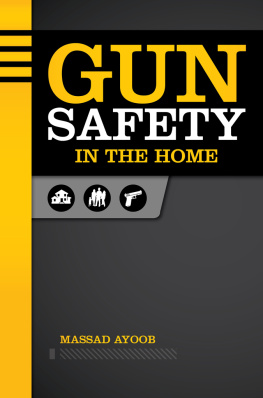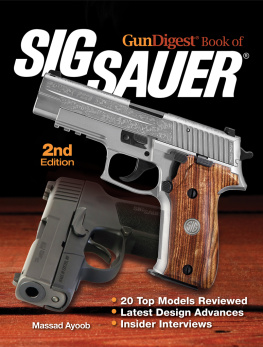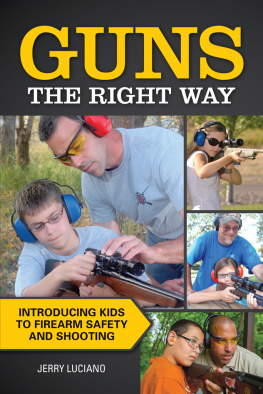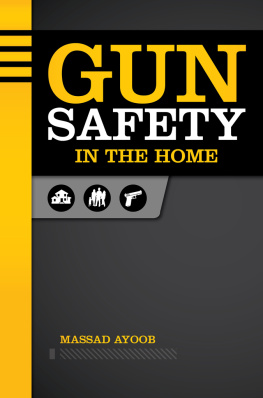Thank you for purchasing this Gun Digest eBook.
Sign up for our newsletter and receive special offers, access to free content, and information on the latest new releases and must-have firearms resources! Plus, receive a coupon code to use on your first purchase from GunDigestStore.com for signing up.
or visit us online to sign up at
http://gundigest.com/ebook-promo
GUN
SAFETY
IN THE HOME
MASSAD AYOOB
CONTENTS
CHAPTER ONE:
CORE FIREARMS SAFETY PRINCIPLES
CHAPTER TWO:
FIREARMS STORAGE IN THE HOME
CHAPTER THREE:
CHILDREN AND GUNS
CHAPTER FOUR:
SAFETY AND GUN ACCIDENTS
DEDICATION
I dedicated my first gun safety book, decades ago, to my daughters. I lovingly dedicate this one to my grandchildren. May they grow up with the same safety, responsibility, and competence as their mothers, who each won national shooting championships in their teens.
INTRODUCTION
Every reader has a right to know where the author is coming from. One of my earliest memories is shooting my older sisters Springfield Model 87 .22 rifle. My father held it balanced on his palm a bit ahead of the trigger guard while I, too short to properly shoulder it, sorta climbed over the stock to aim and fire. Dad told me I was four years old the first time we did that.
Fast forward: I started carrying a loaded, concealed handgun when I went to work in the family jewelry store at the age of 12, legal in that time and place. I started informal competition in local turkey shoots at about 15, and was 19 when family friend Nolan Santy introduced me to formal NRA pistol competition. By age 25 I had become a published gun writer, a police firearms instructor, and a state champion in police combat shooting. Im 65 at this writing. You do the math; its too depressing for me.
There have been a whole lot of bullets put safely downrange since. It has taught me a few things about safety, which are shared here. In the end, its all about common sense.
Use things the way theyre meant to be used. We say that a lot as parents and grandparents; we need to constantly say it to ourselves. Keep your appendages away from the working parts. We do that with table saws and lawnmowers and need to apply it to firearms, too. Ive been the handgun editor for Guns magazine for thirty-some years, and a few years ago I began one column with words to the effect of, I am holding my friends little finger. Unfortunately, hes standing across the room. He had been working the slide of his 1911 .45 pistol from the front instead of the back when it unintentionally discharged and he wound up with nine digits on his hands instead of ten. He asked the people at the hospital to preserve the amputated finger in Formalin. Its a helluva good visual aid when he discusses firearms safety, and teaches people not to end up as he did.
Firearms, if you think about it, are power tools. They drill holes in things and chew things up. Thats their purpose. The purpose of the user is, quite simply, to puncture and destroy the right things and not the wrong things.
Many experts will be resourced here. Ive learned too much from too many to do an acknowledgements page, because I would inadvertently leave some out and hurt someones feelings. In the end, the focus on safety should be credited to the entire firearms-owning community, the gun culture if you will. Contrary to pervasive media propaganda, deaths and injuries inflicted with firearms have gone down in the last several years, despite a huge increase in the number of guns owned privately in the United States.
The following is written in hope of continuing that trend.
CHAPTER ONE
CORE FIREARMS SAFETY PRINCIPLES
The Devil loads the empty gun
Old Latin American saying
The firearm is defined at law as a lethal weapon. The hunter uses it as sporting equipment. The farmer uses it as a tool. The target shooter literally uses it as a remote control paper punch. And, from homeowners to police to military, many people carry them expressly because they are deadly weapons, the only effective tool that can ward off homicidal humans who have lethal capability of their own and are trying to murder the legitimate owners of those guns, or innocent victims within their mantle of protection.
We spend our lives surrounded by dangerous equipment. Automobiles. Anything electrical. Gasoline and countless other flammables and explosives, drain cleaner, powerful medications and countless other toxic substances. Power tools, of which the gun is one in essence, an explosively operated drill that works from a distance.
We must use them all with the utmost care. We must be thoroughly familiar with their proper use. We are responsible for keeping them out of the hands of those who might do harm with them. That category includes unsupervised children, but also encompasses irresponsible or incompetent adults, and anyone who might intentionally use them to commit wrongful acts. This in turn encompasses protecting them from theft. A huge percentage of criminals who commit gun crimes do so with firearms stolen from the law-abiding. There are probably only two products thieves can steal from you that they can sell on the black market for more than their intrinsic value, instead of fencing them for pennies on the dollar: prescription drugs and deadly weapons.
Lets examine some well-established rules of firearms safety. The longest standing are The Ten Commandments of Gun Safety. They have appeared in various forms over the generations. Here is a current version, from Remington Arms.
THE TEN COMMANDMENTS OF FIREARMS SAFETY
(from the Remington Arms website, www.remington.com)
- Always keep the muzzle pointed in a safe direction.
- Firearms should be unloaded when not actually in use.
- Dont rely on your guns safety.
- Be sure of your target and whats beyond it.
- Use proper ammunition.
- If your gun fails to fire when the trigger is pulled, handle with care.
- Always wear eye and ear protection when shooting.
- Be sure the barrel is clear of obstructions before shooting.
- Dont alter or modify your gun and have it serviced regularly.
- Learn the mechanical and handling characteristics of the firearm you are using.
Now, lets look at each of those directives in more depth.
ALWAYS KEEP THE MUZZLE POINTED IN A SAFE DIRECTION
This will ideally mean that the gun is always pointed at something which can safely absorb the most powerful round that particular gun can fire. Up in the air when outdoors seems safe, but every year people are killed or injured by the foolish practice of celebratory gunfire, that is, firearms discharged upward like relatively harmless fireworks. A few years ago, a hunter emptied his muzzleloader at the end of a day afield by firing it skyward. The bullet came down a great distance away and struck in the head a teenage Amish girl in a horse-drawn buggy, killing her.
This element of gun safety is why other detectives get nervous when one investigator in the squad room is carrying his pistol in a horizontal shoulder holster: anyone standing behind him is in line with the muzzle. It is one reason why many shooters refuse to wear an appendix holster, which holds the muzzle of the gun in line with the genitalia and the femoral artery, particularly when the wearer is seated. A gun in a holster, if left alone, is most unlikely to become possessed by demons and fire by itself. However, I remember the off-duty cop in a crowded theater who said he was adjusting his pistol in its concealed shoulder holster when it discharged. Fortunately, nobody was hit by the bullet.














